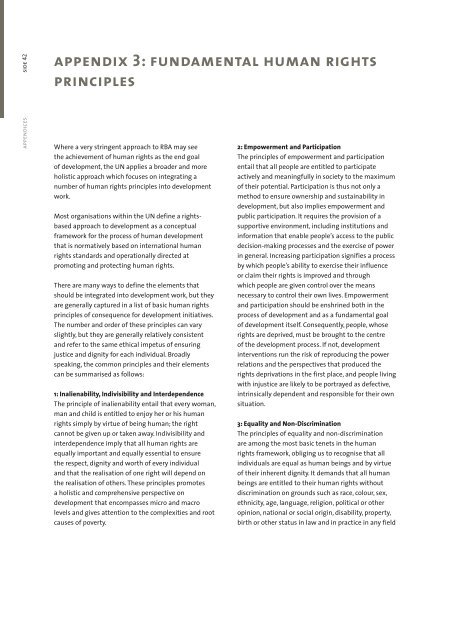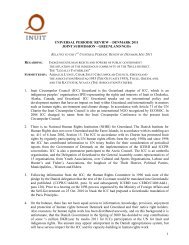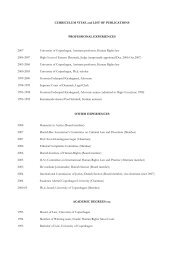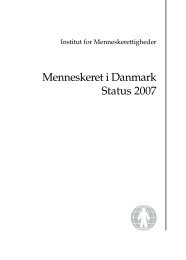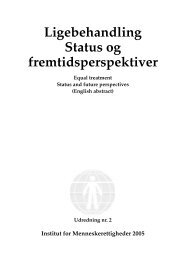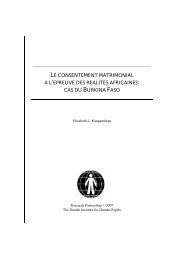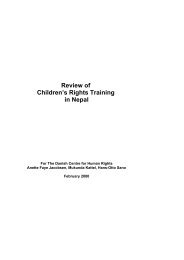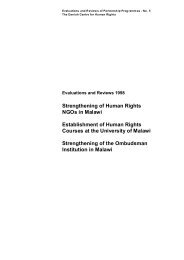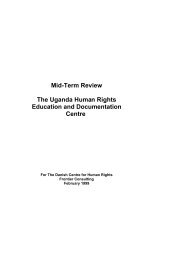applying a rights-based approach - Danish Institute for Human Rights
applying a rights-based approach - Danish Institute for Human Rights
applying a rights-based approach - Danish Institute for Human Rights
Create successful ePaper yourself
Turn your PDF publications into a flip-book with our unique Google optimized e-Paper software.
appendices side 42<br />
appendix 3: fundamental human <strong>rights</strong><br />
principles<br />
Where a very stringent <strong>approach</strong> to RBA may see<br />
the achievement of human <strong>rights</strong> as the end goal<br />
of development, the UN applies a broader and more<br />
holistic <strong>approach</strong> which focuses on integrating a<br />
number of human <strong>rights</strong> principles into development<br />
work.<br />
Most organisations within the UN define a <strong>rights</strong><strong>based</strong><br />
<strong>approach</strong> to development as a conceptual<br />
framework <strong>for</strong> the process of human development<br />
that is normatively <strong>based</strong> on international human<br />
<strong>rights</strong> standards and operationally directed at<br />
promoting and protecting human <strong>rights</strong>.<br />
There are many ways to define the elements that<br />
should be integrated into development work, but they<br />
are generally captured in a list of basic human <strong>rights</strong><br />
principles of consequence <strong>for</strong> development initiatives.<br />
The number and order of these principles can vary<br />
slightly, but they are generally relatively consistent<br />
and refer to the same ethical impetus of ensuring<br />
justice and dignity <strong>for</strong> each individual. Broadly<br />
speaking, the common principles and their elements<br />
can be summarised as follows:<br />
1: Inalienability, Indivisibility and Interdependence<br />
The principle of inalienability entail that every woman,<br />
man and child is entitled to enjoy her or his human<br />
<strong>rights</strong> simply by virtue of being human; the right<br />
cannot be given up or taken away. Indivisibility and<br />
interdependence imply that all human <strong>rights</strong> are<br />
equally important and equally essential to ensure<br />
the respect, dignity and worth of every individual<br />
and that the realisation of one right will depend on<br />
the realisation of others. These principles promotes<br />
a holistic and comprehensive perspective on<br />
development that encompasses micro and macro<br />
levels and gives attention to the complexities and root<br />
causes of poverty.<br />
2: Empowerment and Participation<br />
The principles of empowerment and participation<br />
entail that all people are entitled to participate<br />
actively and meaningfully in society to the maximum<br />
of their potential. Participation is thus not only a<br />
method to ensure ownership and sustainability in<br />
development, but also implies empowerment and<br />
public participation. It requires the provision of a<br />
supportive environment, including institutions and<br />
in<strong>for</strong>mation that enable people’s access to the public<br />
decision-making processes and the exercise of power<br />
in general. Increasing participation signifies a process<br />
by which people’s ability to exercise their influence<br />
or claim their <strong>rights</strong> is improved and through<br />
which people are given control over the means<br />
necessary to control their own lives. Empowerment<br />
and participation should be enshrined both in the<br />
process of development and as a fundamental goal<br />
of development itself. Consequently, people, whose<br />
<strong>rights</strong> are deprived, must be brought to the centre<br />
of the development process. If not, development<br />
interventions run the risk of reproducing the power<br />
relations and the perspectives that produced the<br />
<strong>rights</strong> deprivations in the first place, and people living<br />
with injustice are likely to be portrayed as defective,<br />
intrinsically dependent and responsible <strong>for</strong> their own<br />
situation.<br />
3: Equality and Non-Discrimination<br />
The principles of equality and non-discrimination<br />
are among the most basic tenets in the human<br />
<strong>rights</strong> framework, obliging us to recognise that all<br />
individuals are equal as human beings and by virtue<br />
of their inherent dignity. It demands that all human<br />
beings are entitled to their human <strong>rights</strong> without<br />
discrimination on grounds such as race, colour, sex,<br />
ethnicity, age, language, religion, political or other<br />
opinion, national or social origin, disability, property,<br />
birth or other status in law and in practice in any field


